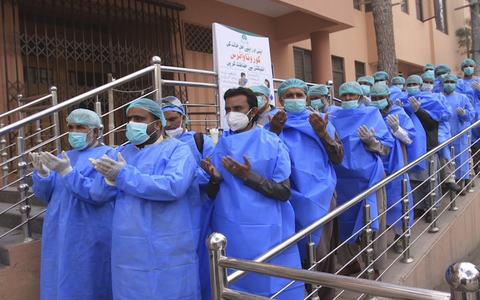ISLAMABAD: As the deadly pandemic claimed another life in Pakistan on Thursday, the National Coordination Committee (NCC) on Coronavirus decided to maintain the present policy of enforcement of lockdown in the country, close all educational institutions till May 31 and ensure uninterrupted food supplies, besides keeping the prices of essential commodities stabilised during the prevailing emergency-like situation.
A meeting of the NCC, presided over by Prime Minister Imran Khan and attended by Chief of the Army Staff Gen Qamar Javed Bajwa, decided to hold another session on Friday to take a decision with regard to suspension of transport throughout the country.
Prime Minister Khan apprised the participants of the meeting of his plan to establish a force of young volunteers to ensure supply of food items to the poor at their doorsteps and set up a fund with the support of philanthropists and overseas Pakistanis to fight the coronavirus pandemic.
The NCC also decided to halt all arrangements for Haj 2020 on the advice of the Saudi government.
Extends closure of educational institutions in country to May 31 • Halts arrangements for Haj on advice of Saudi govt • Coronavirus kills elderly man in Lahore
The decisions taken by the NCC were announced at a news conference by Minister for Planning and Development Asad Umar, Minister for Religious Affairs Noorul Haq Qadri, Special Assistant to the Prime Minister (SAPM) on Information Dr Firdous Ashiq Awan, SAPM on Health Dr Zafar Mirza and National Disaster Management Authority (NDMA) Chairman Lt Gen Mohammad Afzal.
“The NCC reviewed its earlier decision regarding closure of educational institutions till April 5 and now it has decided to keep them closed till May 31,”
Mr Umar said. He added that the meeting decided to keep intact the existing status of lockdown in the country.
The status of lockdown in the provinces and the federal capital is said to be different as Prime Minister Khan has rejected the idea of imposing curfew in the country, saying it is the last stage of lockdown which cannot be imposed at present because it will create further complications for the poor and daily wagers. 00
Under the lockdown, all educational institutions have already been closed, public gatherings banned and markets shut except some shops like medical stores, grocery and meat shops, etc, and Section 144 of the Criminal Procedure Code has been imposed to prevent gathering of four and more people.
Asad Umar said there was no shortage of essential food items in the country and refuted media reports regarding shortage of wheat flour. “We have ample stocks of 1.7 million tonnes of wheat in the country and its next crop is ripening and will come to the market soon,” he said, adding that the government would ensure prompt procurement and transportation of the new wheat crop.
The prime minister, he said, was quite concerned about food supplies in the prevailing situation and decided to take stern action against those found involved in hoarding essential food items.
The panning minister said the meeting had declared all medical practitioners, doctors and paramedical staff, presently engaged in hospitals and quarantines for the treatment of coronavirus-affected people, as Mujahid and decided to provide all necessary protective equipment for their own safety against the deadly disease.
He said the government had devised a mechanism for coordination with the provinces for implementation of [Rs1.15 trillion] relief package announced by the prime minister on Tuesday so that its benefits could be transferred to the poor in every part of the country.
Regarding the youth volunteer force and fund of overseas Pakistanis, Mr Umar said: “The prime minister will make an important announcement in the next two days in this regard.”
The meeting decided that in order to have better coordination between the provinces and the Centre, representatives of the provincial and federal governments would sit at NDMA’s National Command Centre. In this way, they will share important data and coordinate with each other in a better manner.
Religious Affairs Minister Qadri said the NCC had decided not to close mosques but minimise the presence of people during collective prayers [Bajamaat Namaz] and Jumma congregation. “It was decided in consultation with ulema of all schools of thought that children and old age people will not be allowed to attend prayers in the mosques.”
He said he had received a letter from the government of Saudi Arabia regarding suspension of Haj arrangements and in the light of the letter the meeting also decided to halt necessary arrangements being made for Haj, such as hiring of buildings and hotels for stay of Pakistani pilgrims, caterers for their meals and agreements with airlines.
The spokesperson for the Punjab health department confirmed the death of an elderly man in Township.
Published in Dawn, March 27th, 2020

















































